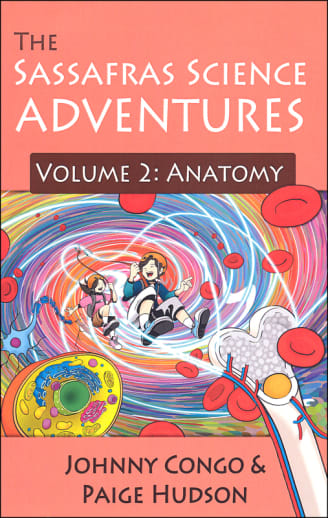Sassafras Science Adventures Vol 2: Anatomy
Description
What a delightful way to learn science! Read a story, perform experiments, keep a log, and learn some science. This Charlotte Mason style, hands-on, inquiry-based science program might be just what your children need to understand and enjoy science. From the same publisher as Elemental Science, this Sassafras Science follows the Sassafras Twins as they travel the world. The underlying storyline is that the twins felt science was boring and pointless. Despite Mom and Dad's warnings, they continued their lackluster approach towards science and failed through science classes. Consequently, they are not able to be with friends over their summer break, and must spend their summer with their crazy (or is he?) Uncle Cecil. Uncle Cecil and his lab assistant, President Lincoln, develop a series of invisible zip lines and special carabiners that take Train and Blaisy (Uncle Cecil's names for the children) on the adventure of a lifetime as they learn to love science.
Each course requires the Reader, Guide and Scidat Logbook. The story-based science instruction is found in the Reader. The correlating Guides offer road maps for your travels. Divided into chapters, it contains summaries, additional information and instruction for the Scidat Logbook, encyclopedia readings and supplemental library lists, an experiment, vocabulary, copywork & dictation, additional activities and more. An appendix includes reproducible pages (for family use). The Scidat Logbooks become a record of your child’s journey. It includes illustrations, maps to color or mark locations, a place to document projects, and note pages. The Logbook is not reproducible, so you will want one for each child. A fair amount of writing is expected, making this a slightly more intensive curriculum. Parents with younger children may wish to assist them or “buddy” them up with an older sibling to maintain the family learning experience.
Each Adventure
covers approximately one semester, and it is recommended (for the story
purpose) that the books be completed in order. Each volume, however, begins
with a brief overview of the previous book so it may be possible to start with
later volumes if your young scientist has previously covered the topic.
Optional supplemental resources are mentioned, including various children’s encyclopedias and library book lists for families wanting to study the topic more in depth. Occasionally, a scheduled title may not be available. Families may choose a similar resource and match the topic to enhance learning if they wish.
| Product Format: | Paperback |
|---|---|
| Grades: | 1-6 |
| Brand: | Elemental Science |
| ISBN: | 9781935614241 |
| Length in Inches: | 8.5 |
| Width in Inches: | 5.5 |
| Height in Inches: | 0.5 |
| Weight in Pounds: | 0.9062 |

